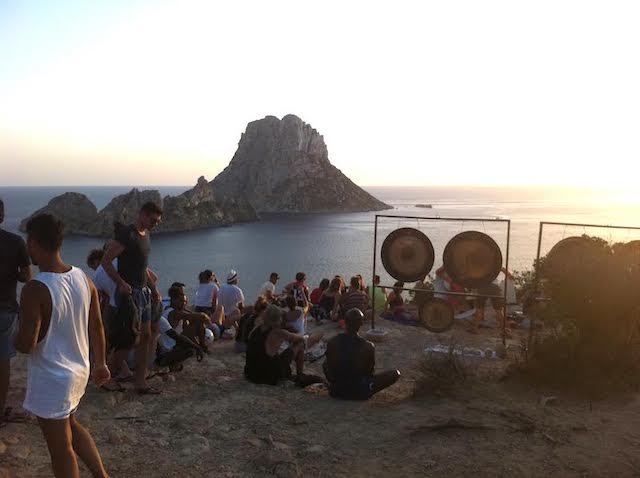
“The journey of a thousand miles, begins with a single step.” ~ Lao Tzu
It’s true—you work hard and deserve a holiday, not a lecture about another environmental sin.
Who doesn’t need an escape from time to time? Especially when it’s another grey Monday morning at the office and we hate our colleague who’s sitting too close to us talking in a loud voice and slurping her boring tea like she does every single morning.
Our mind starts to wander—to palm trees that rise to the sky, to the welcoming warm sun, to laziness in a hammock, to that book we can’t wait to read.
A place away from home where nobody knows us, life is good, people smile, and everyone wears flip-flops.
The good news is, we can hop on planes around the world, served by ever cheaper and more frequent flights, headed to ever more destinations. There is no end to it.
But while we’re busy booking our next holiday, nothing could be further from our mind than our impact on our hosts—hosts in the broadest sense of the word: the environment and its inhabitants.
I never used to think of our environmental impact the moment I was booking a holiday either, so I understand. But, slowly, I’m losing my sympathy for this mindset.
At one time, I was the tourist on the popular holiday island, Ibiza. Four years ago, I became one of the sunlit Spanish island’s caring inhabitants when my husband and I moved there permanently. We went from being tourists to hosts, witnessing the disturbing effects of unsustainable mass tourism to the paradise island.
Our holiday destinations are other people’s homes, and our brand new destination was someone else’s destination last week. So how do we ensure we have our well deserved holiday, and when we get there find its residents happy to see us and its environment thriving for us to enjoy?
First, let me tell you a bit about Ibiza, the island where writers, artists, painters, hippies, and free spirits have found refuge since the 1950s and 1960s. (During the Vietnam War, young American men fled to Ibiza to dodge the draft.)
Over last few decades, Ibiza has attracted vacationers from all over the world with the electronic beats of celebrated DJs like Carl Cox, Paul Kalkbrenner, Steve Aoki, and Joris Voorn. People are partying ’til the early morning in the many clubs the island is known for, places where Freddy Mercury had his own hotel room, where sexy women dance by the poolside, and where George Michael recorded his unforgettable summer hit video “Club Tropicana.”
Ibiza: a place ruled by the sun, the crystal blue sea, and music.
It has an open energy where humans of all kinds flock together: the spiritual hippie and freedom junkie, the business-minded, the jet setters, the super rich with their helicopters and mega yachts, and the “poor” who have to skimp each winter as there is hardly any employment outside the tourist season. Even yoga and nature lovers are coming to Ibiza to enjoy beautiful walks, to rest, and recharge.
The island has become one of the most popular holiday destinations in Europe. Last summer we had 3.2 million visitors to barely 150,000 residents on an island only six times the size of Manhattan.
The island’s main industry is, obviously, tourism. The tourist season is from May until October, and Ibiza needs the tourists. It’s profitable; people earn their living through tourism, but not without damaging consequences to its environment and its natural resources. Will this idyllic island and hotspot survive in this era of mass tourism? Or will its “success” be its downfall? What could you, the tourist, do about it? Or do you just have to stay home or go elsewhere?
For Ibiza and its islanders, I feel it’s time to change tack. We need a voyage of recovery and understanding. A course to sustainable and conscious tourism.
It probably doesn’t seem realistic or fair to expect this change to come from you, sitting at home booking your flight. After all, what do you know and what can you do?
The ecological consequences of mass tourism are, for the most part, hidden. It’s all under the (sea) surface. Air and sea pollution caused by transport, the increasing demand of electrical energy, the threatening shortage of water each summer and the destruction of ecological systems like posidonia (a vital seagrass that lives in front of the shores of Ibiza and her sister-island, Formentera, that purifies the sea).
We don’t feel affected and don’t see the consequences—at least not yet—and especially not those who are only here for a short time. But we do see tons of plastic waste and cigarette butts spoiling the beaches. Surely we all feel affected by that.
I think we can all agree that this kind of tourism is ruining some of the most beautiful places on earth.
But just because we know mass tourism is killing the natural environment and natural resources in certain destinations, the “tourist is all to blame” game doesn’t paint the whole picture. Big businesses, the clubs, and the resorts are reaping the benefits from mass tourism. They should definitely play a key role in moving toward a more sustainable, responsible tourism.
“Better holidays for a better world.” It sounds like a cheesy marketing slogan, but they have to adopt this attitude for a sustainable future.
Luckily, I already see a bit of conscious holiday-making in Ibiza—tourists who prefer a bicycle over a jet-ski, the ones who would rather stay in an authentic Ibizan home in the countryside, who prefer local food over popular resorts and restaurants that spoil water and energy without batting an eye. Caring tourists do exist. And I hope you will care too, once you set foot on Ibiza’s magical soil.
Responsible and sustainable tourism is slowly awakening, but it’s still a long journey to go.
Now, back to you on your rainy day, sitting on your computer about to book a holiday with palm trees and sunny beaches in your head. Here’s what you can do to make a difference:
1. Look for eco-friendly, small, and locally owned accommodations.
It’s not easy to find eco-friendly accommodations on Ibiza online. The places that are doing business with respect to the environment are mostly the rural hotels, agroturismos. Only a few of them are run according to environmental principles, like recycling rainwater, using solar energy, farming their own organic vegetables and fruits, and featuring natural pools.
Finca Can Marti in the north of Ibiza is an excellent choice. If this exceeds your budget or this isn’t your cup of tea, you can look for locally owned B&B’s or smaller accommodations on platforms like Airbnb. By doing so, the economical benefits are more likely to support the locals who love their island rather than the big hotel chains whose only interest is making profit.
2. Pick hotels and resorts that tell what they do to be eco-friendly and sustainable.
If staying in an agroturismo isn’t what you’re looking for, finding a traditional hotel or resort with heart for the environment is hard work. A website where we could find sustainable, eco-friendly hotels at a glance would be a valuable initiative. I haven’t been able to find such a website. Why not ask your favorite hotel or resort what their sustainability policy is before making a reservation?
3. Support the local community and locally owned restaurants.
Bravo if you succeed in finding eco-friendly accommodation. If not, there’s another way to travel responsibly: visit the local food markets, local shops, and locally owned restaurants. Your support benefits small(er) business owners, and ultimately the island as the economical profit doesn’t flow away abroad to big corporations.
4. Be conscious with water.
Ibiza is short on water. So what can you do use it consciously? It’s the small things: take short showers rather than water-wasting baths to purify your sweaty, salty skin. Also, close the tap whilst you’re lathering yourself up and brushing your teeth.
5. More love and care for the beaches, the seas, the nature, and the hosts.
Throw plastic in the recycle bin. Have drinks at the beach, but without those dreadful straws. It’s a shame to see polluted beaches. Nobody wins. Therefore, treat your holiday destination like you treat your home, with love and care. This shouldn’t be hard work.
6. Travel closer to home.
We know air travel has a damaging impact to the environment. In general, a greener alternative will be picking a destination closer to home and traveling by car, or even better touring by train. The eco-friendliest way to journey to Ibiza, though, would be a bicycle and a sailboat. Make yourself an instant eco-warrior.
One extreme measure to curb unsustainable, harmful tourism is closing down hotspots in order to allow nature to restore itself. Boracay, a Philippine “Blue Lagoon”-like island and holiday destination for 2 million tourists each year, has temporarily closed its doors to tourism.
We don’t want another Boracay—and to prevent this, we need tourism to become more sustainable and travelers to become more conscious. Only then can this small island can maintain its natural magic.
The quality of the natural resources depends on our habits and our daily actions; we must keep this close to our heart.
It is vital to take spending our holidays with attention and respect to the most important host—the environment—into our own hands.
I say “cheers” to a mindful holiday this summer!
Author: Eva De Vor
Image: Author’s own; Michael Benz/Unsplash
Editor: Emily Bartran
Copy editor: Yoli Ramazzina






Read 0 comments and reply